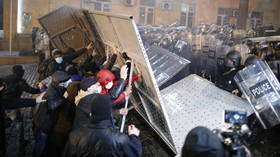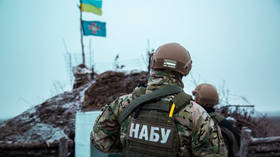Echoes of Maidan: Georgia has a huge Western-funded NGO sector and regular outbreaks of violent protest, is there a link?
What lies behind this week’s scenes in Tbilisi and why was Russia again used as a scapegoat?
Tbilisi’s main street, Rustaveli Avenue, was blocked for several days this week as thousands of people chanted anti-government slogans in front of the parliament building and sang the Georgian national anthem. Even more protesters gathered at the square in the evenings. By nightfall, the enraged crowd was throwing firecrackers, stones, and Molotov cocktails at the police, attempting to take down an iron fence and storm the parliament. The police used water cannons to promptly put out the fires and showered the crowds with water, at the same time spraying tear gas to disperse those present.
What led to this violent confrontation is perhaps difficult to understand from the perspective of a Western reader. It wasn’t a “civil society” uprising in the sense you might find, for example, in a country like France. Instead, it was organized by people whose livelihoods were threatened by the proposed legislation.
In a poor country like Georgia, foreign-funded roles pay multiple times better than local gigs. By taking on the NGO industry, the government went up against a powerful, and relatively well-heeled lobby.
Inside the crisis
The protests were initially triggered by a bill ‘On the Transparency of Foreign Influence’, which was adopted by the Georgian parliament on its first reading. On Tuesday, 76 deputies voted in favor of adopting the bill and 13 deputies opposed it.
During the discussion stage, MPs from opposition parties said they would not allow the so-called “Russian law” to be considered in parliament. This resulted in a fight between opponents and supporters of the legislation. Deputies from the National Movement and Strategy Aghmashenebeli opposition parties were expelled from the chamber. Triggered by the situation, the latter’s leader Giorgi Vashadze called on all opponents of the bill to join the rally.
On Wednesday afternoon, the Georgian Interior Ministry reported that 50 law enforcement officers had been injured in clashes with protesters. Calls from the police to “stay within the bounds of the law” did not work.
On Tuesday, rallies against the “foreign agents” bill lasted more than ten hours. What began with anti-government speeches ended with violence involving the police. Protesters hurled Molotov cocktails, while cops responded with tear gas in an effort to disperse the crowds. Clashes lasted late into the night, until the protesters finally headed home. The next day, things were much the same – only this time, the crowd was significantly larger. People gathered with posters reading “#NORUSSIANLAW” and waved the flags of Georgia, Ukraine, and the EU. They were more organized, and some protesters, having learned from their previous experience with the police, came equipped with ski goggles and protective masks.
Just like on Tuesday, the rally started peacefully: people chanted slogans and sang the national anthem. But as night approached, trouble intensified. Finally, Strategy Aghmashenebeli leader Vashadze presented an ultimatum to parliament: reject the “foreign agents” bill and release everyone who was detained on March 7. According to Georgia’s Formula TV Channel, he gave the authorities one hour to do so.
Yet even before that time was up, protesters began to surround the parliament building, which led to violent clashes with the police. The crowd threw stones and firecrackers at the building, resulting in broken glass and police injuries. Officers responded decisively and severely. Using water cannons, smoke grenades, and pepper spray, the police and special forces were finally able to drive the protesters away. Just like the previous day, it was to be 4am until the crowd finally dispersed.
By Thursday morning, pressured by the protesters, the ruling Georgian Dream party and its ally the People’s Power party issued a joint statement announcing their decision to withdraw the bill that had provoked public discontent. Despite this, the protests finally died down only by Friday afternoon.
But why did the document cause such vehement protests?
Country of foreign agents
Talk of such legislation first emerged last summer. Back then, several influential Western-funded NGOs immediately understood the existential nature of the possible measure. They announced the formation of a “temporary technical government” and presented the authorities with an ultimatum, threatening them with a “peaceful revolution” if they refused.
The strong reaction to the initiative does not seem surprising considering how many foreign NGOs are active in Georgia. In a review of the Georgian civil sector published in 2020, the Asian Development Bank indicated that there is no special legislation on non-profit or non-governmental organizations in the country, although they are listed in the general register of companies, which as of the beginning of 2019 consisted of 12,800 organizations. At the same time, the vast majority of such organizations rely on foreign funding, according to the Georgian national statistics service Sakstat. As of spring 2022, there were 7,972 companies with foreign founders operating in the country. With a total population of 3.7 million, there are around 460 people per foreign NPO in Georgia. For comparison, as of November 2022, there were over 500 active “foreign agents” registered in the US, under FARA.
NGOs and people associated with them played an active role not only in the ‘Rose Revolution’ of 2003, when ex-President Mikhail Saakashvili came to power, but also in 2012, when the now ruling Georgian Dream party first took office, according to the bank’s study.
A number of Georgian politicians who have assumed senior positions, both during the reign of Saakashvili and after the Georgian Dream coalition came to power, began their careers in NGOs.
Since gaining independence in 1991, Georgia has become a major recipient of US aid. In the 1990s, the country received an average of $96 million a year, in the 2000s, before the brief 2008 war, $135 million a year, and after the military conflict, the amount of assistance was increased. In the 2008-2009 fiscal years, Georgia received US assistance in various areas to the amount of $1.04 billion.
From 2010 to 2016, Georgia received up to $77 million annually, since 2017 – up to $123 million on average. For 2020, it was planned to provide Tbilisi with $120 million through the State Department and the United States Agency for International Development (USAID).
The annual budgets of the most influential Georgian NGOs are comparable to the turnover of medium-sized commercial companies. According to calculations by political scientist Beka Chedia, the Soros Foundation alone invested more than $10 million in the Georgian third sector in four years (from 2003 to 2006). The CIA-linked National Endowment for Democracy, according to its own reports, distributed $1.2 million in grants in 2013 among three-dozen projects of Georgian NGOs. The main areas of their work were civic education programs, media support, including investigative journalism, election monitoring, and civil control over the activities of the executive legislative branch, among others.
At the same time, the economic situation for Georgians outside the NGO bubble isn’t great: according to data for 2021, the country’s GDP per capita was just $5,000.
A Russian trace…
The Georgian bill proposed a national register of “foreign influence agents.” The register would have listed all non-profit legal entities and media organizations which receive 20% or more of their funding from abroad.
The opposition described the law as “Russian,” referring to the determination to resist the attempts of the Georgian Dream party to “drag the republic back into dark Russia.” However, there are numerous differences between the Russian law and the Georgian bill.
Firstly, unlike the Russian law, the Georgian bill does not oblige foreign agents to accompany each text and audio message with a statement disclosing their foreign agent status. Secondly, to avoid the connotations used by Moscow and Washington, Georgian authorities replaced the term “foreign agent” with “foreign influence agent.” The former, according to representatives of the People’s Power party, “carries the risk of stigmatization.”
Nevertheless, the bill caused concern among representatives of NGOs, the media, and the opposition, who believed that the Georgian Dream and People’s Power parties are trying to copy Russia in “fighting ‘foreign agents’.” Instead, they advocated that people fight for “freedom of speech in the country.”
Russia’s experience prompted the protesters in Tbilisi to see the supposed influence of Moscow behind the Georgian authorities’ decision. Indeed, the opposition and the protesters contrasted their nation’s “European integration path” with the alleged “pro-Russian course” of the ruling party. This position was shared both by local protesters and Russians who have emigrated to Georgia for political reasons.
“This was taken from the Russian law. It’s a copy of it. We don’t need that. This law threatens many people and will not let us join the EU,” a Tbilisi local named Nino told RT.
Many young people adopted these sentiments. “My friends and I all went [to the protest]. This is our fight for the way to Europe,” said a man named Guram when talking about the March 8 rally.
…in a US law
Incidentally, the bill was not initiated by the ruling party, but by the People’s Power movement. This group was formed by former Georgian Dream deputies who left the party following the protests of March 2022. For bureaucratic reasons, the EU postponed Tbilisi’s application to join the bloc. Protests broke out, and the demonstrators blamed the Georgian authorities.
A member of the People’s Power movement stated that the purpose of the proposed “foreign agents” bill was to “inform,” not restrict, the activities of NGOs and media. The party offered assurances that the law would ensure the “transparency of foreign influence,” adding that they had relied on US experience when developing the bill, while adapting it to the realities of Georgia.
On February 21, the Bureau of the Parliament of Georgia registered the so-called “Georgian” version of the bill, and on February 27 – the “US” version, and submitted both to the legal committee for consideration. It was specifically the first bill that was passed and then withdrawn. According to People’s Power, this version, in contrast to the second “US” one, “proposed a minimum standard of transparency and only obliged foreign influence agents to submit an annual financial declaration.” Moreover, the Georgian bill stated that only a legal entity could be declared a “foreign influence agent,” and there was no criminal liability in case of violation, unlike in US law and in the second version of the bill.
On February 28, despite disagreements from the opposition, the leader of the Georgian Dream party, Irakli Kobakhidze, confirmed his wish to adopt one of the versions of the law.
“We ask [the Venice Commission to conduct] an accelerated procedure, after which the version of the bill that will receive the most positive assessment will be finalized,” Kobakhidze said.
Along with Tbilisi Mayor Kakha Kaladze and Parliament Speaker Shalva Papuashvili, Kobakhidze consistently refuted statements made by the opposition that the law was a copy of the Russian one. He insisted that deputies developed the first version independently, while the second version was copied from the US analogue, FARA.
On March 6, it became known that the Legal Issues Committee of the Parliament of Georgia backed both bills – the “Georgian” and “US” versions – in the first reading.
Finally, on Tuesday, after a meeting of the Bureau of Legal Affairs, Mamuka Mdinaradze, a member of the ruling Georgian Dream party, offered to discuss the laws during the same session, and not on Thursday as was originally planned. That same evening, when almost none of the representatives of the opposition were present, parliament adopted the bill ‘On the Transparency of Foreign Influence’ in the first reading.
Who fueled the protests?
Throughout the discussions, the opposition and media accused Georgian Dream of pro-Russian views, branding the bill “Russian” and “Putin’s” law. The former leader of the ruling party, Bidzina Ivanishvili, who retired from politics in 2021 but is still considered the informal ruler of Georgia, didn’t escape criticism either.
“In my opinion, the Georgian Dream party has always been about self-power. In other words, its main goal was to stay in power. On the other hand, Ivanishvili is truly pro-Russian in the sense that he sympathizes more with Russia, his mentality is Russian, he understands Russia better. For him, the West, Western values, and Western thinking are all alien and incomprehensible. In this respect, he is not just pro-Russian – he is a Russian person,” political analyst Ghia Nodia said in an interview with local media.
Some protesters agree with these views. Ani, a local realtor, believes that the nation’s current leaders are “authoritarian” and are pursuing a “harmful pro-Russian course.”
Sixty-three Georgian mass media organizations and NGOs formed a coalition with the opposition and called the new bill “anti-democratic and unconstitutional.” According to pro-Western social movements and parties, merely discussing the bill “harms Georgia’s European perspective” since it prevents Georgia from implementing two recommendations of the European Commission that are needed to achieve the status of an EU candidate country. According to Paragraph 7, Georgia must undertake “more active efforts to ensure a free, professional, pluralistic, and independent media environment.” Additionally, Paragraph 10 implies that the Georgian government must ensure “the involvement of civil society in decision-making processes at all levels.”
In fact, the US and the EU warned Georgian authorities that the successful adoption of the law would deprive the country of the chance to acquire EU candidate status and join NATO.
One of the highest-ranking supporters of the protesters was Georgian President Salome Zurabishvili. “I am addressing everyone who is on Rustaveli street tonight, where I often used to stand myself. Today I’m in New York, and the Statue of Liberty is right behind me. This is a symbol of what Georgia has always fought for, what we have come for so far. I am with you because today you represent free Georgia,” she said in an address on Tuesday.
President Zurabishvili expressed confidence that “no one needs this law” and it is “written at the dictation of Moscow.” “This law is invalid, I will veto it,” she added.
Russia denies any involvement in the events. Kremlin Press Secretary Dmitry Peskov said on Friday that the trigger of the public unrest in Georgia “has nothing to do with the Russian Federation.”
“At the same time, we see someone’s hand in this matter, and it’s far from ‘invisible’. We can see where the president of Georgia is addressing her people from, she is not addressing Georgians from Georgia, she is addressing them from the United States. And someone’s visible hand is earnestly trying to inject anti-Russian elements there,” he said.
Peace or rebellion?
On Thursday, after preliminary information emerged that the bill would be withdrawn, Georgian Dream chairman Mdinaradze hastened to clarify the situation at an emergency briefing. He spoke about the procedure of withdrawing the draft laws. According to Mdinaradze, the bill ‘On the Transparency of Foreign Influence’ which was adopted in the first reading would be rejected in the second reading. As to the second version of the law ‘On the Registration of Foreign Agents’, on which no vote has been held so far, it was already withdrawn from parliament. It was also noted that a letter was sent to the Venice Commission regarding the withdrawal of both bills.
By Thursday evening, the Ministry of Internal Affairs had released 132 of the 133 detainees and issued a conciliatory statement.
“We see that the adopted bill has caused disagreements in society. By the means of lies, the bill was presented in a negative light and misled a part of the population. The bill was falsely labeled a ‘Russian law’ and its adoption in the first reading was publicly presented as a departure from the European course,” the Georgian Dream and People’s Power parties said in a joint statement.
The statement also noted the parties’ ongoing commitment to “the advancement of Georgia on the course of European integration.”
The decisions by the authorities had an effect – by Friday afternoon, the protests had completely subsided, and the barricades had been dismantled in the center of Tbilisi. However, that was not before the capital had seen another night of protests dominated by overtly anti-Russian sentiment.
The protests continued on Thursday, and the opposition made even more radical demands. A group of Georgian army veterans unexpectedly called for the resignation of the government and early parliamentary elections.
“These authorities are unable to lead Georgia toward Europe, these authorities only beat up peaceful people. This government should resign, and early parliamentary elections should be held,” proclaimed a man dressed in camouflage, who called himself an army veteran.
During the protests on Thursday, the Russian flag was burned and some protesters were heard chanting slogans demanding a resolution to the “Abkhazian issue.” Chanting “Sukhumi” – the Georgian name of the capital of the partially recognized Republic of Abkhazia, where Russian peacekeeping forces are located – the crowd demanded the issue be solved with the “unconquered” region.
***
It’s worth noting that not all locals share the protesters’ views. Some Georgians, especially those who earn a living from the tourism sector and Russian migrants, are a lot less enthusiastic.
“There is a difference between this rally and normal life. Last year, things were good. The Georgian lari was growing against the dollar. A lot of currency circulated. This was largely because of the Russians and Ukrainians who arrived. In the summer, there was a record number of tourists as well. Housing was in large demand. People even rented places they didn’t want before. We had a lot of money. And now what? With this law, all these protests and rallies, things look quite bad. Apparently, someone doesn’t want things to go well. Who needed this law right now? Salome is in America. I don’t know what’s going on with this law, but the market is on the decline. The market on Airbnb fell by 20%. People are scared and they leave. Who needs all this?” complained Irakly, a local resident.













Comments are closed.